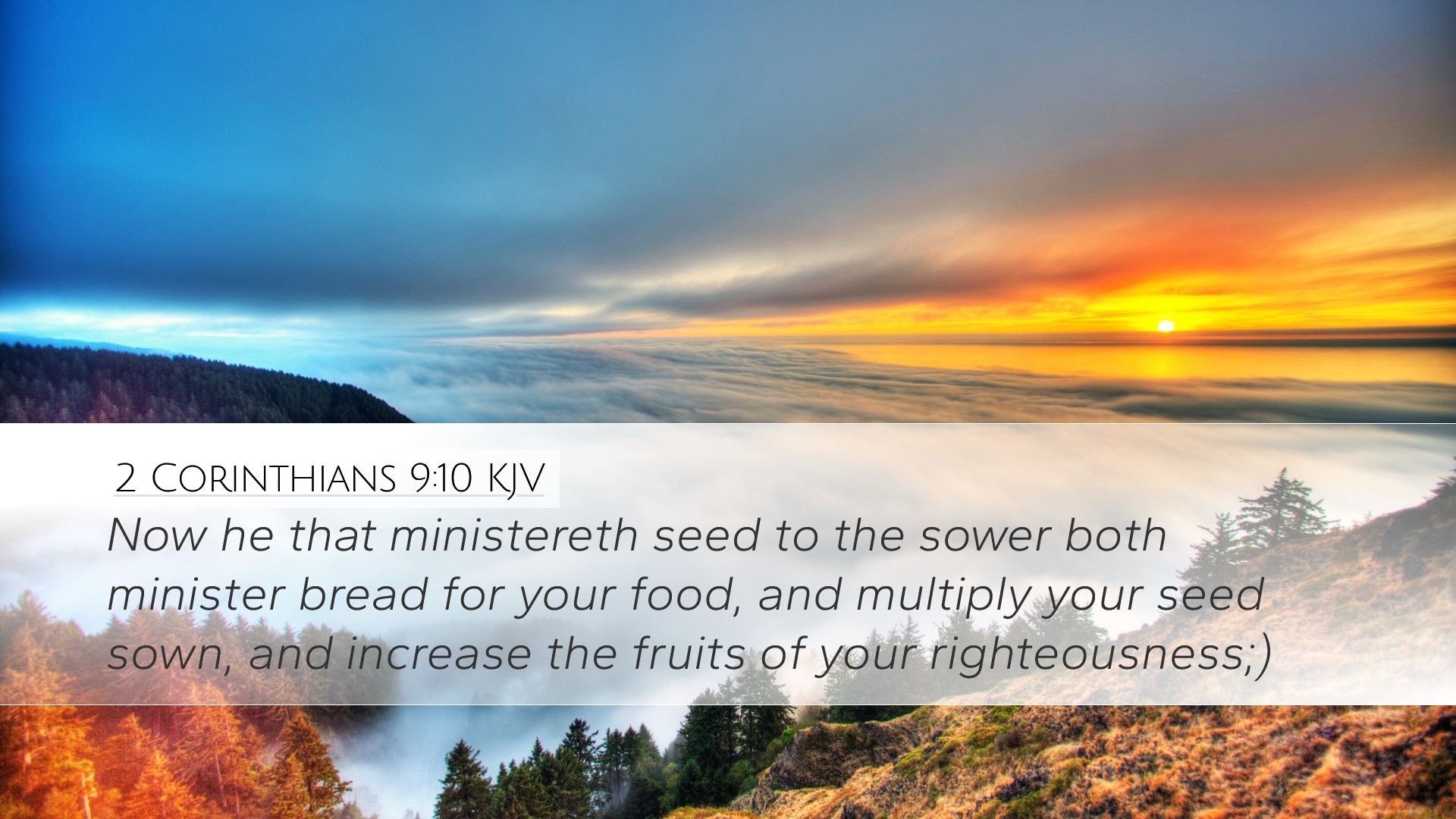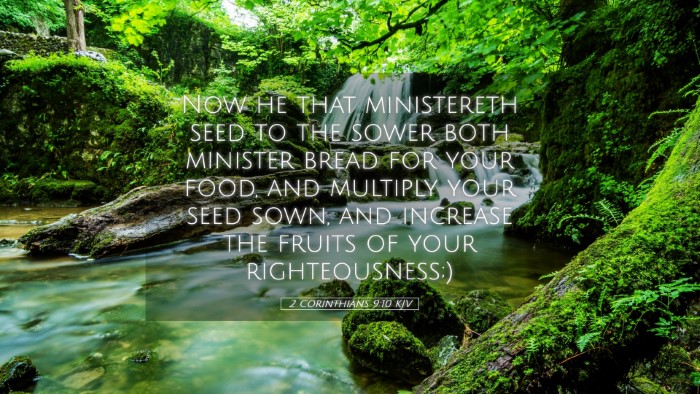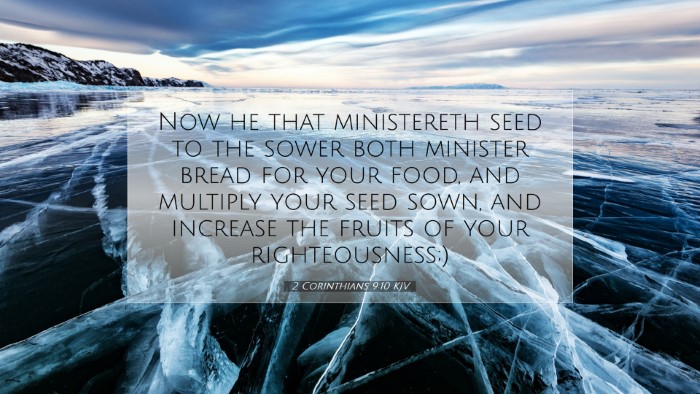Old Testament
Genesis Exodus Leviticus Numbers Deuteronomy Joshua Judges Ruth 1 Samuel 2 Samuel 1 Kings 2 Kings 1 Chronicles 2 Chronicles Ezra Nehemiah Esther Job Psalms Proverbs Ecclesiastes Song of Solomon Isaiah Jeremiah Lamentations Ezekiel Daniel Hosea Joel Amos Obadiah Jonah Micah Nahum Habakkuk Zephaniah Haggai Zechariah Malachi2 Corinthians 9:10
2 Corinthians 9:10 KJV
Now he that ministereth seed to the sower both minister bread for your food, and multiply your seed sown, and increase the fruits of your righteousness;)
2 Corinthians 9:10 Bible Commentary
Commentary on 2 Corinthians 9:10
Verse: "Now he who supplies seed to the sower and bread for food will supply and multiply your seed for sowing and increase the harvest of your righteousness."
Introduction
In this profound verse, the Apostle Paul delivers a message of encouragement to the Corinthians regarding their generosity and stewardship. This commentary seeks to unpack the layers of meaning presented in this text, drawing on insights from prominent public domain commentaries, including those of Matthew Henry, Albert Barnes, and Adam Clarke.
Exegesis of the Verse
To fully understand the implications of 2 Corinthians 9:10, one must consider the context in which Paul writes. This chapter addresses the attitude of giving among believers, urging them to contribute generously to the needs of others, particularly for the impoverished saints in Jerusalem.
Analysis of Key Phrases
-
“He who supplies seed to the sower”:
Paul begins with a metaphor that resonates deeply with agricultural societies. The "supplier" refers to God, the ultimate source of all resources, enabling His people to fulfill their roles as sowers in the spiritual and material realms. Matthew Henry emphasizes that this seed is a clear representation of the means by which believers can produce good works and righteous deeds.
-
“And bread for food”:
This phrase signifies God's provision not only for spiritual nourishment but for physical sustenance as well. Albert Barnes notes that the metaphor of bread aligns with Christ's teaching about God’s faithful provision for all His creation. This duality of God’s provision underscores His care for the whole being of the believer.
-
“Will supply and multiply your seed for sowing”:
Paul assures the Corinthians that their efforts in giving will not go unnoticed or unrewarded. Adam Clarke remarks that God enriches the generous, providing them with even greater opportunities to give. This multiplication of seed reflects the principle of abundance in God's kingdom wherein acts of sowing lead to bountiful results in both material and spiritual realms.
-
“And increase the harvest of your righteousness”:
The harvest mentioned here represents the fruits of a life lived in accordance with God’s will. Matthew Henry asserts that part of the harvest includes not just the righteousness seen in one's actions but also the spiritual growth and maturity that result from faithful stewardship. This harvest testifies to the transformative power of God's grace in the believer's life.
Theological Implications
This verse encapsulates critical theological principles regarding God’s provision, human responsibility, and the economy of grace. Each element within the verse speaks to the relationship between the Creator and His creation, especially in the context of spiritual and material generosity.
Divine Provision
The principle illustrated here is that God both provides for His people and expects them to utilize those provisions for His glory. As emphasized by Barnes, God's provision is not merely for personal consumption but is intended to equip believers to further the ministry and serve the needs of others.
Call to Generosity
Paul’s exhortation serves as an appeal to the Corinthians (and to all believers) to adopt a generous spirit, recognizing that their gifts reflect God's own generosity. Clarke notes that this passage challenges believers to engage in acts of kindness and charity, contributing to the building up of the church and the community beyond mere obligation, but as a response to God’s grace.
Application for Believers
The practical implications of 2 Corinthians 9:10 extend to various aspects of a believer's life. The encouragement to trust in God’s provision can alleviate anxiety related to giving and serving. The understanding that acts of generosity yield spiritual fruit encourages believers to adopt a posture of open-heartedness towards both their resources and their relationships.
Encouragement in Stewardship
Believers are called to be wise stewards, consistently looking for ways to invest their time, talents, and treasures in ways that glorify God. This stewardship not only enriches the lives of others but also fosters a deeper sense of community and mutual support within the body of Christ.
Raising a Culture of Generosity
The passage inspires churches and ministries to cultivate a culture of generosity that mirrors God’s own. As believers demonstrate open-handedness, they foster an environment where mutual support becomes the norm, reflecting the kingdom values that Jesus taught.
Conclusion
In sum, 2 Corinthians 9:10 serves as a powerful reminder of God’s unending provision and our calling to be generous in our giving. The insights gleaned from the observations of Henry, Barnes, and Clarke affirm the verse's multifaceted meaning and its relevance for pastoring, teaching, and guiding the faithful. May believers embrace the truth of this scripture, growing in righteousness and reflecting the heart of God through their acts of kindness, mercy, and love.


